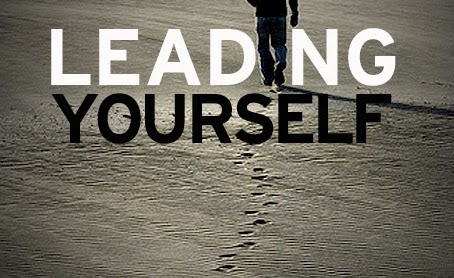Caring for yourself is not a selfish thing to do but it is one of the most neglected duties of a leader. Sometimes it is referred to as "self-leadership." If someone can't lead themselves, how can he or she hope to lead others?
Throughout nearly 3 decades of learning and applying leadership, self-care has been the thing I may have done the best. I say that based on what friends, colleagues and accountability partners have said to me. I'm proud of that. The concept found it's way into my
50th Birthday axioms:
Take time for myself. Refresh. Renew. Recharge. Refocus. Regularly.
Here are the most valuable things I done over these years. It is these activities that make my leadership actions more effective and focused.
1. Read and learn. A leader is a learner. A leader is a reader. I read voraciously, pouring over a wide range of topics. I don't read just church leadership and theology books. I love history, particularly the colonial period, so my shelves are filled with historical fiction and non-fiction about the period. For the past 2 years I've begun reading articles and blog posts from Harvard Business Review (HBR). The point is my reading isn't just about leading a church but about leading both myself (with topics such as "
how to not let e-mail waste my time") and people in general.

My books will not be worth much when I'm gone because I mark them up. I bracket sentences and paragraphs, sometimes adding a topical notation and then some wonderful volunteers type them into files. These become searchable notes for teaching, planning, sharing and continued learning.
Two apps are helping me read and learn these days. I really enjoy
Flipboard on my iPad. It allows me to get the gist of an article to see if I want to capture the whole thing. The second is Evernote. I am an
Evernote fanatic, having gone 95% paperless around my home and office. Evernote is not a toy but a great tool that has made me more organized and the information I deem important more accessible. These have helped me learn and grow even on the run.
2. Sabbath. It should seem to be a no-brainer that a Pastor would regularly practice a sabbath rest, so prominently put forth in the fourth commandment. It is not the case unless I plan for it. And I understand most every other job doesn't allow for it.

One of my final classes at
Asbury Seminary was with my friend Dr. Steve Harper. We addressed the spiritual life of Pastors, a great class for those of us ready to launch out of the seminary nest and dive full-time into the world of the local church. One book helped prepare me for the priority of a sabbath -
Working the Angles by Eugene Peterson. He encouraged sabbath as one of the key components of a healthy soul, a foundation for the work of ministry in the local church. I began to practice these "days away" immediately and I truly think they made ministry a long-term calling, saving me from the burnout that can so easily come.
Sabbath isn't about doing something in particular. I encouraged full-time staff to take one day a month as a Sabbath. There was no report on what was done. Doing something isn't the point. Some wanted to prescribe the "what" but that essentially destroys the practice. Sabbath is about honoring God and that can differ from month to month and person to person.
Sabbath for me has become about making sure my soul is full of God. Sometimes the most spiritual thing I could do was sleep. Other times it was spending special time with my wife. Some days have been spent along the Ohio River in Bicentennial Park with a Bible, some paper and a pen, but no agenda.
My practice has been: a day a month, 2-4 days twice a year. It's what's worked for me.
3. Vacation. A sabbath is not a vacation, even though I might turn off my cell phone and stay away from email on both. I made sure that I took vacation time, realizing that the office would take as much time as I'd give it. Memorable times included: 23 days out west pulling a pop-up camper, the northern route to the Pacific and back through the central U.S.; 14 days along the East Coast, sort of a Colonial theme; 18 days to Greece & Israel; 12 days on a 25th Anniversary cruise to Alaska; and those 12 years to Key Largo after Christmas with my father-in-law.
A combination of sabbath and vacation fueled my decision to take a 3-month Sabbatical in 2012. Privileged to receive a
Lily Grant, I took off from Memorial Day to Labor Day. It remains today the most important decision I made to renew, refresh and retool: a marriage conference; some swim meets, including Olympic Trials; a trip to England & Scotland with the family; my son and I to Costa Rica for fishing and whitewater rafting; and I also programmed in time with an executive coach who could press me. While I unplugged from the day to day of the church world, I made sure I had someone who would challenge my assumptions and point out my blindspots. I worked on my marriage, made memories with family, furthered my officiating experience and grew as a leader. It was all well worth the effort.
Too many people are afraid to get away, fearful of what might happen while they're gone. I understand that more than you know. But your family and your ministry (whether full-time or as a local church servant) deserve it and will benefit from it. Even with everything that happened the months following my sabbatical, we've agreed we wouldn't change our choice.
4. Physical Health. I've always leaned toward the healthy side of living. Having been a competitive swimmer for 16 years, I know the value of exercise and how easy it is to get out of shape. It was extremely difficult if not impossible for some years as we had teenagers in the house. But I know that we make time for the things that are important.

When my dad died just shy of 75 years (about 7 years ago) I renewed my determination to stay healthy. I re-engaged a regimen of racquetball and swimming, and added P90X. While I'm not in the best shape of my life (that was as a college athlete), I am in the best shape of my life since then. This is the only body I get and I want it to be an asset not a detriment.
I want to serve Jesus to my last breath
I understand some things are not under my control but I'm doing whatever I can to make sure this body serves the Kingdom rather than allowing my body to limit my service to the Kingdom. I'm on medication for an out-of-balance cholesterol issue, but I'll still do everything I can to control it without the meds. I don't want to waste dollars on health care that can be cared for by some self-leadership on my part.
It's been said that exercise will add two years to your life - although you'll spend those two years exercising! I'll take it. The benefits of how I feel are well worth it. Exercise and healthy eating give me more energy and better focus to be a more attentive husband, better father, more consistent friend and more grateful servant of Jesus.
What are you doing to lead yourself? How could these four priorities work in your life? Anyone can just go through life. It takes self-leadership to go through life with intention and purpose.
































